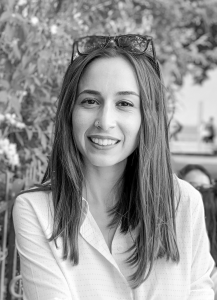Please tell us about your career pathway to date (positions and institutes).
My journey started in Greece, holding a BSc in Nutrition and Dietetics from Alexander Technological Educational Institute of Thessaloniki. Since I was keen on learning more about clinical nutrition, I then obtained a MSc (Med Sci) in Human Nutrition with specialization in Clinical Nutrition from the University of Glasgow, UK.
After that, I did an internship at the Joint Research Center of the European Commission in Italy and in particular at the Institute for Health and Consumer Protection. There, I worked on science-based policy support in the field of nutrition, participating in a foresight project and evaluating the effect of merging innovation and technology in the food and pharmaceutical area. When I returned back to Greece, I was a research assistant in European and National research projects in the area of endocrinology and nutrition. I also taught nutrition for professionals while I was working with children and adolescents living with diabetes, eating disorders or obesity.
I currently work as a PhD candidate in the AI in Health and Nutrition group of ARTORG Center for Biomedical Engineering Research which belongs to the University of Bern, Switzerland. I am involved in different projects regarding dietary monitoring and assessment with the use of innovative technologies and especially apps. I have published 14 papers in peer-reviewed journals.
How would you briefly describe your current research/job to someone who is not familiar with your field of study/work? What is your main research interest?
Well, I am part of a team of engineers and I basically offer the clinical input and user perspective to the team. I am mostly involved to the goFOOD project ,aiming at developing Artificial Intelligence-based approaches for dietary monitoring and assessment and I am also closely working in the setup and execution of the related study protocols.
What are the main barriers you encounter/experience when conducting research, or what information/skills do you lack to conduct high quality research?
Interesting question! It is challenging to collaborate with people coming from different scientific fields but at the same time, it is very rewarding to end up having common goals looking them from different perspectives. Moreover, technological advancement is rapid and thus, following all the new research is sometimes difficult. Apart from this, when writing a proposal for mHealth, for example, you have to be sure that the literature that you intend to include contains technological aspects that are not considered yet as “old”.
What could help you as a student/ECR to further develop/grow in your current position?
Meeting people in the field of nutrition and behavior change research and exchanging opinions and ideas would be extremely helpful. Brainstorming and learning each other’s background and views is essential in order to be able to achieve something great together!
What do you think will be the next most important development in the nutrition and/or physical activity field?
I believe that mHealth will be a useful tool both for the healthcare professionals, as part of their clinical practice, and for the researchers who are mainly involved in epidemiological studies. Furthermore, ending up to the most effective behavior change techniques and digital tools of dietary assessment that match individuals’ needs would have a great impact on their everyday life. Lastly, NCDs are increasing worldwide and we need eHealth tools that reach people who may not have easy access to healthcare (e.g. rural areas).
If you’d like to get in touch with Maria, you can do so via email [email protected] or Twitter @VasiloglouMaria


